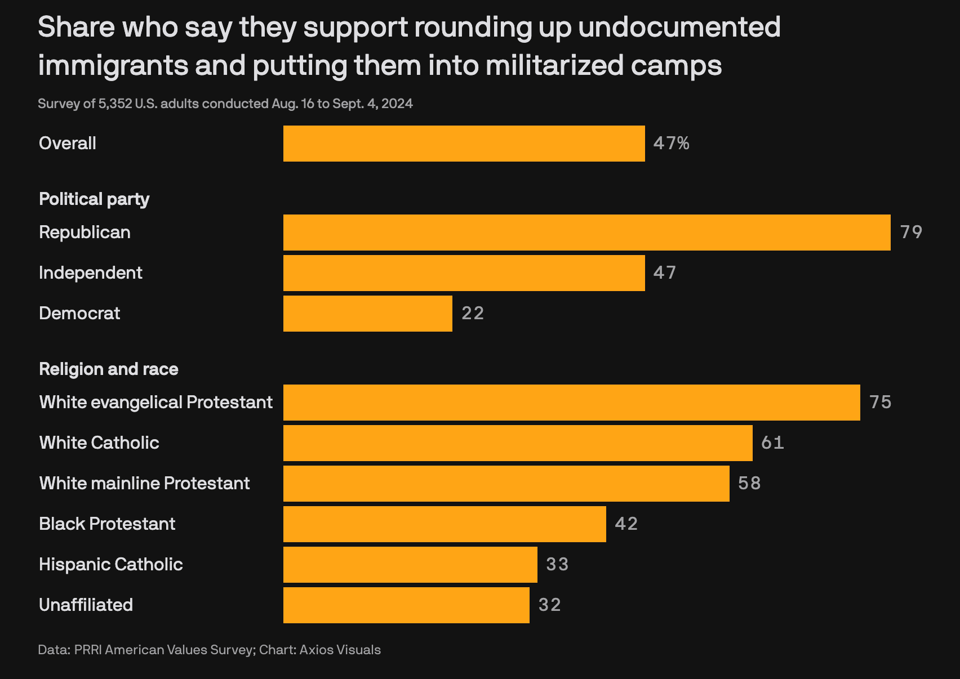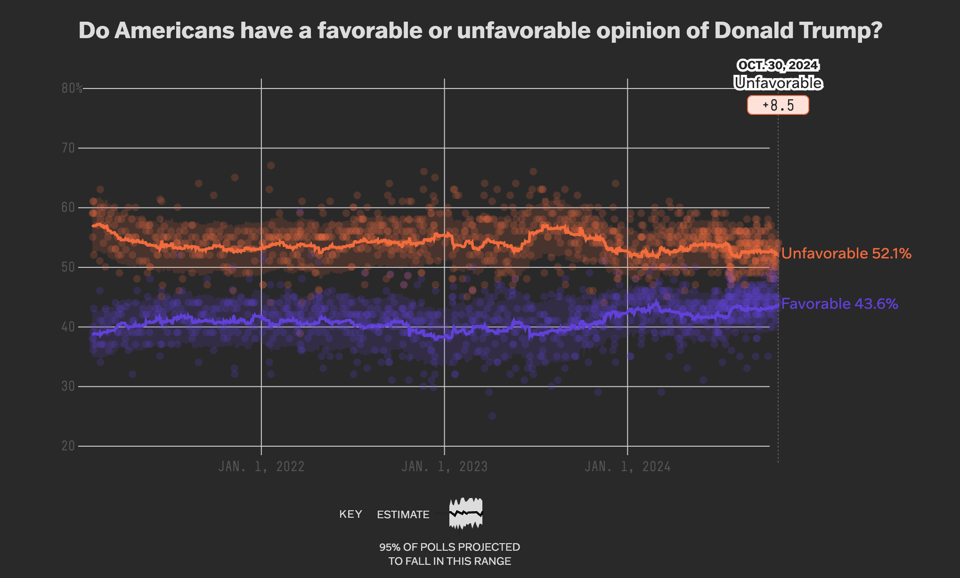A Foul Wind

Numbers have always had this weird grip on me—they just stick. I think it traces back to my days playing fantasy baseball in the '90s. By now, “Nate’s into numbers” is an established fact in my life, both a blessing and a curse. It’s been great for investments, sure. But every so often, I'll come across a truly lousy stat that refuses to leave me alone for weeks. This happened last month when I read this datapoint in the recent PRRI American Values Survey:

"Americans are divided on whether they favor (47%) or oppose (50%) rounding up and deporting immigrants who are in the country illegally, even if it takes setting up encampments guarded by the U.S. military. Nearly eight in ten Republicans (79%) favor putting undocumented immigrants in encampments, compared with 47% of independents and 22% of Democrats." Emphasis added.
There’s a lot to unpack there but the screaming headline is that 47% of the people in this poll essentially said “yes, I think we should put undocumented immigrants in concentration camps.”
Let’s unpack this a bit more.
First off and most pedantically, I disagree with PRRI’s use of the phrase “Americans are divided” in this context. The reliability of polls in the era of the cellphone is deeply questionable and others smarter than me have written acres on this.
In my class, when we discuss polling, I intentionally refer to the results as being reflective of “respondents.” A poll is the voice of the people polled—it’s supposed to be a proxy for the total populace but we have seen that proxy become less and less reliable over time. So, if I was writing about this for my students, I’d write “47% percent of respondents said….”
On the other hand, the PRRI survey is notable for its larger than normal sample size, 5027 adults. Most political polling you see has a sample size of between 800-1200 people, which statisticians say, if truly randomized, are a representative sample of the populace.
Thus, I believe this data is only reflective of the respondents but that doesn’t make it any less alarming that nearly half the respondents including 75% of white evangelicals and 22% of Democrats are pro-immigrant concentration camps, an indicator of the insane right-ward drift on immigration the country has undergone since 2015.
But let’s back this train up for a moment and talk about what the “American Values Survey” actually is. Conducted annually by the Public Religion Research Institute (PRRI) it examines Americans’ views on various social, political, and cultural issues. It captures data across party lines, religious groups, and demographics, giving a snapshot of general public opinion and comparing this report to prior ones, we get a glimpse at how opinions are changing over time.
The survey’s findings usually generate think-pieces and are indicators for candidates for national office where the political winds are blowing and holy hell those winds are foul.
A slim majority of PRRI respondents support building a wall on the Southern border:
Support for building a wall along the U.S. border with Mexico has grown from 41% in 2016 to 51% today. Republicans (88%) are more than four times as likely as Democrats (21%) to support building such a wall.
To be clear, I don’t think that’s true for the populace. I think this highlights why we should be skeptical of taking this data at face value as being representative of the total populace. I just don’t think that a majority of us support that stupid ass wall. Lemmie show my work a bit: I also don’t think there are large numbers of people who are “pro-wall” and also “anti-Trump” and we know from historical and recent polling (as much as it can be trusted) that his approval ratings are upside down, in the low forties. This is echoed in the PRRI data, “a majority of Americans (56%) have an unfavorable opinion of the Republican presidential nominee, while 41% have a favorable opinion of him.” Notably, at no time in his four year presidency nor two-year campaign for re-election has a majority of respondents in national polling seen him favorably (see below and pardon that digression).

But it is undoubtedly true that the foul winds of support for a wall and overall anti-immigrant and nativist sentiment are up. This inhumane zealotry is a disgusting portend of what is to come when the political coalition supporting it takes power. It’s worth a quick history lesson here: whatever a country does to immigrants or other people it deems undesirable, it will soon come to other groups it despises. Tyranny spreads.
Breathe, Nathan.
I am an immigrant, more specifically, I am a “labor migrant.” I’m not an expatriate or a “digital nomad.” I am an immigrant. I, like millions of people in the US, left my home and went overseas to seek different and unique opportunities. I was welcomed here and have found a welcoming community of other immigrants and locals. Over the last five years, I have broken bread at iftars, the meal at the end of the Ramadan fast, with my Muslim colleagues, and have been invited to the homes of Emirati students for dinner, dessert and gallons of tea (so much tea). I have learned how to flip-off bad drivers using Arab and South Asian hand signals.
This is how it's supposed to work but we've clearly lost our way.
The Statue of Liberty is one of the national symbols of the US. Inscribed on in base is a message we've clearly forgotten:
Give me your tired, your poor, Your huddled masses yearning to breathe free. The wretched refuse of your teeming shore. Send these, the homeless, tempest-tossed to me, I lift my lamp beside the golden door!
Now a different wind blows.
We have to reject the cruel, callous, anti-immigrant sentiments. These winds carry a stench of division and hostility, a smell so foul it reaches even those who’d prefer to turn away, close their windows, or change the channel. This isn’t a temporary breeze; it’s the buildup of years of fear, resentment, and forgetting who we claimed to be.
I lived in Tacoma for 37 years. I know a thing about foul winds—they can change direction. We’re not locked into the tides of hate or the walls of bigotry. The air is within our control. And if enough of us remember the promises etched in that giant statue we all seem so proud of, we can reclaim it from this awful, funky, bitter gale.
–
This week on the podcast I had a conversation with retired educator and current journalist, Anne Lutz Fernandez. We discussed the first term record on public education of the Trump administration, what the Biden/Harris administration has done, and what a second Trump term might look like for American schools. If you care about public education, and you should, you should follow Anne on the socials and peep this episode.
See you next week, on the other side of the election.